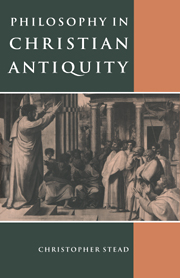18 - Philosophy, faith and knowledge
Published online by Cambridge University Press: 29 September 2009
Summary
Augustine is by far the ablest philosopher of late antiquity. He is also one of its best-known characters; he reveals his inmost thoughts at many points in his voluminous writings, but particularly in the Confessions, which recalls his early life and his conversion, and in the Retractations, one of his last productions, in which he gives a chronological survey of his written work and explains the corrections which he now wishes to establish. More than most ancient writers, his thought underwent a development which is closely related to his changing occupations and concerns. This makes it difficult to capture in a brief account; all its phases are interesting and worthy of note. And there is a particular difficulty in treating of Augustine as a philosopher. The enormous literature he has inspired of course includes examinations of his philosophical thought; but the great majority of these are written by admirers, who moreover share the basic assumptions of his metaphysics. Many modern philosophers, at least in the Anglo-Saxon tradition, reject these assumptions altogether, or in large part, as I am impelled to do myself, and are thus bound to be handicapped in providing a survey which is at once appreciative, scholarly and critical.
Augustine was born in 354 at Tagaste in North Africa, about 200 km west of Carthage and some 700 km south-west of Rome. His father Patricius was a pagan till late in life, his mother Monica a Christian.
- Type
- Chapter
- Information
- Philosophy in Christian Antiquity , pp. 219 - 229Publisher: Cambridge University PressPrint publication year: 1994

